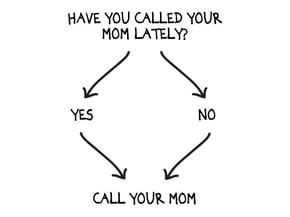 If you’re the adult child or part-time caregiver of a senior living in Cincinnati, how can you ensure that your parent will be safe, healthy and happy in 2017? It can be distressing to worry about older loved ones if you don’t see them every day — especially if they live alone.
If you’re the adult child or part-time caregiver of a senior living in Cincinnati, how can you ensure that your parent will be safe, healthy and happy in 2017? It can be distressing to worry about older loved ones if you don’t see them every day — especially if they live alone.
Today, let’s review some of the warning signs that your parents might exhibit if they are losing their ability to live independently. We’ll then talk about what you can do to help keep them safe.
Watch for clues
When older loved ones start having difficulty keeping up with the necessary tasks of daily life, it’s usually a strong indicator that a permanent change in the independent living arrangement is necessary. It might not mean they need to move out of their home, but you may need to bring in home health care or other community-based services to ensure their safety.
It’s important, as parents age in place, that you regularly check in with them in person. When you’re at their home, observe carefully. What do you see? How do you parents look and act? Is the home in order? The following are strong indicators that a parent is losing his or her ability to self-sustain:
- Poor eating habits or repeated claims of no appetite. Many people eat progressively less as they age. It’s partially a function of shrinking stomachs, but can indicate larger issues. Poor appetites may point to a lack of energy to prepare meals, to depression or loneliness, to illness, or to medication side effects. If you notice your parent consistently isn’t eating well, schedule an appointment for him or her to be seen by the doctor.
- Unusual weight loss. Weight loss can occur due to poor appetite, but serious medical conditions and medication interactions can also cause it. If you notice your parent losing weight, his or her doctor will want to investigate the circumstances.
- Untidiness. If your mom or dad has always been a stickler about keeping the house clean, but you notice things looking consistently unkempt — dirty dishes piled in the sink, garbage not being taken out, unmade beds, dirty bathrooms, clothing piled on chairs, etc. — it could indicate that your parent either has physical difficulty performing basic housework or is depressed.
- Scorched pots and pans. One of the telltale signs that a parent is becoming unable to cope with daily tasks is scorched pots or pans, which can point to forgetfulness while cooking. That’s of particular concern, as pots left scorching on a stove can catch fire.
 Refrigerator and pantry aren’t stocked, or aren’t stocked with healthy foods. If your parent is having difficulty cooking for him or herself, you may start to notice that the freezer is stocked only with microwaveable meals and the pantry is stocked only with canned and processed foods. If the cupboards are bare, it may indicate financial stress, forgetfulness, or appetite changes.
Refrigerator and pantry aren’t stocked, or aren’t stocked with healthy foods. If your parent is having difficulty cooking for him or herself, you may start to notice that the freezer is stocked only with microwaveable meals and the pantry is stocked only with canned and processed foods. If the cupboards are bare, it may indicate financial stress, forgetfulness, or appetite changes.
- Poor hygiene. Is your parent skipping days on showering or bathing? Does he or she consistently have body odor or bad breath? Is his or her hair combed and kempt, or wild and tangled? Are nails going untrimmed, or teeth going un-brushed?
- Forgetting to refill or take medications, or losing track of what he or she has taken. These, for obvious reasons, are potentially serious issues.
- Always seen wearing the same outfit, or always seen in a bathrobe. If your parent is no longer changing clothes, or is no longer doing laundry, it’s a strong indicator that something is amiss.
- Yard work and general home maintenance aren’t getting done. If the grass is tall, weeds are growing in the gardens and paint is flaking off the siding, one starts to wonder. Does your parent just need extra help? Is money too tight?
- Losing track of finances. Does your parent hide money, double-pay bills or lose money? Does he or she have difficulty keeping track of bank balances or investments?
- Unopened mail. If the mail is piling up and unopened, your parent may be depressed or exhibiting early signs of dementia.
- Unable to drive safely. Has your parent had a few fender-benders over a short period? Drive significantly below the speed limit? Seem overly anxious while merging, or won’t drive at night? It may be time to talk about giving up the keys.
- Missing appointments. If your parent is missing doctor appointments, lunch dates with friends, family events, or other pre-arranged meetings, he or she may be becoming forgetful, or may be severely depressed.
- Lots of minor injuries, unusual bruising, or shuffling gait. If your parent always seems to have a scrape or cut, a bruise or two, or shuffles when he or she walks, there may be issues with physical strength, coordination and/or balance. These could be due to medication interactions, to general aging, or to a more serious medical condition.
- Seems overly anxious or distracted, is consistently repeating self, or exhibits unconnected thoughts. These may be indicators of developing dementia, of medical or psychiatric conditions, or of adverse medication interactions. If the mental status change is abrupt and pronounced, your parent should be seen by a doctor right away, as it could indicate a stroke, sepsis (system-wide infection), or a serious chemical imbalance.
- Exhibits slurred speech or talks in “word salad,” facial drooping, referring to deceased loved ones or friends as if they are living, etc. These would all be signs consistent with strokes or other serious medical conditions. Immediately take your parent to the emergency room.
Preventative steps to keep your older parent safe
If you notice any of the warning signs above, act. Don’t “give it another week.” Serious conditions can come on insidiously and worsen suddenly in older people, and the consequences of inaction can be dire.
If you haven’t noticed any of the classic warning signs of loss of independence, here’s what you can do to keep your older parent safe and healthy:
 Text, call and visit regularly. The more contact you have with your parent, the less likely it is that he or she will feel lonely or depressed, and the more likely it will be that you’ll notice status changes early on.
Text, call and visit regularly. The more contact you have with your parent, the less likely it is that he or she will feel lonely or depressed, and the more likely it will be that you’ll notice status changes early on.- Ask your parent about his or her wishes. Many adult children are uncomfortable broaching the subject of in-home nursing care, assisted living placement, or end-of-life care with their parents. But having those conversations before they become necessary is a good idea; they ensure that your parent’s desires and needs will be met when he or she is no longer to express them.
- Make sure your parents have designated medical and financial powers of attorney and signed a living will. Get the documentation in place before your family needs it. Have a mutually agreed-upon care plan ready to go in case your parent were to take a sudden downturn.
- Ensure that your parent is having regular checkups. Your parent should have a full physical, plus dental and ocular (eye) checkups, at least once a year.
- Access community-based services, or arrange for assisted living, as it becomes necessary. Maybe your parent is generally able to maintain him or herself, but has difficulty shopping or cooking? It might be beneficial to sign him or her up for a meal delivery service like Deupree Meals on Wheels.
Or maybe he or she has difficulty managing a health care regimen? It might be helpful to bring on a case management service like Living Well Senior Solutions, to arrange for in-home nursing, or to discuss moving to a Continuing Care Retirement Community like Marjorie P. Lee.
If you’re the adult child or part-time family caregiver of a senior living in Cincinnati, use the information above to help keep your loved one safe, happy and healthy in the New Year. Or, if you know someone who could benefit from this article, share it with him or her on Facebook, or email the link!












